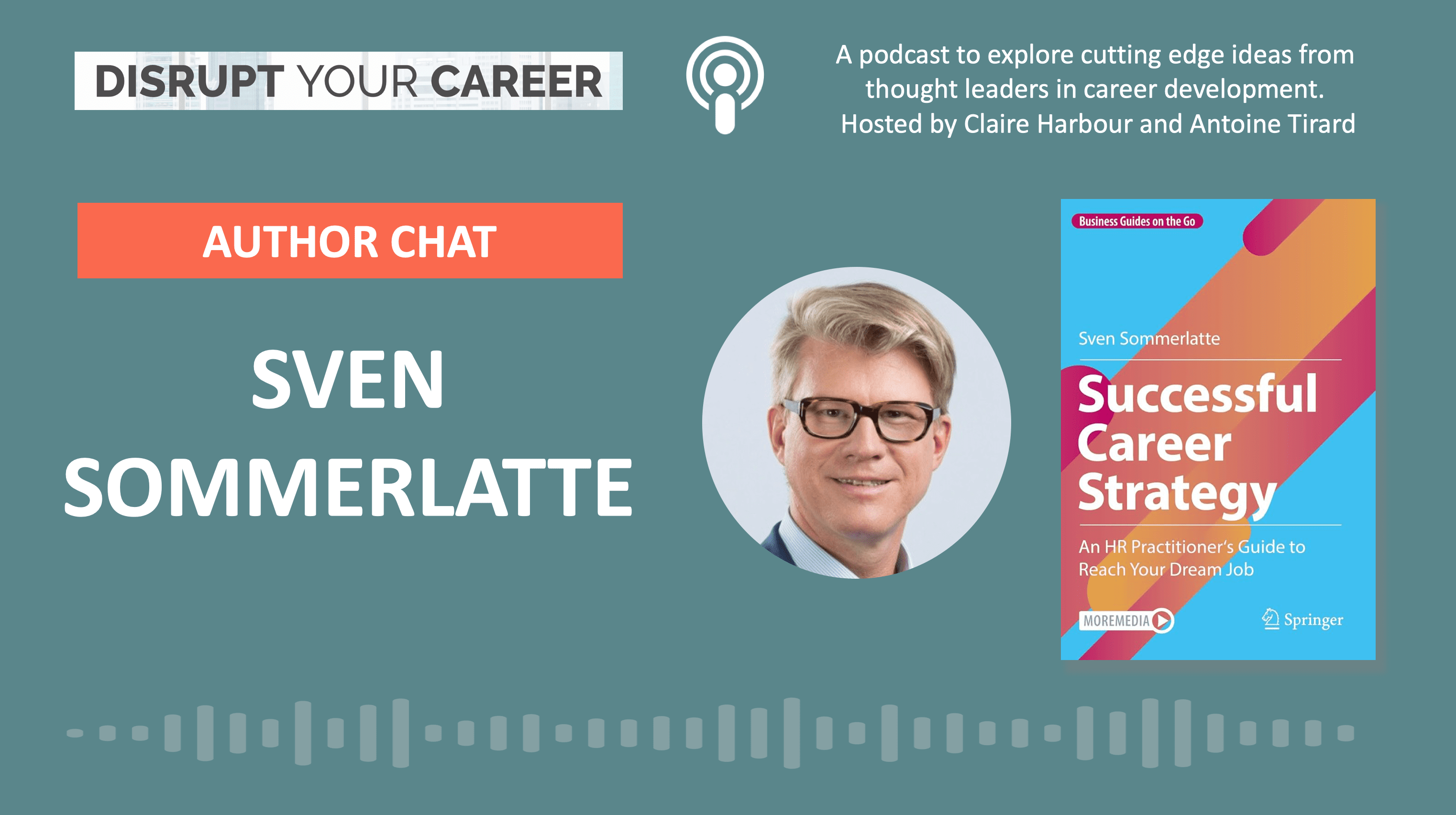
Author Chat: Successful Career Strategy by Sven Sommerlatte
CHRO and author Sven Sommerlatte shares the basic methodology as well as practical tools and a variety of case studies that are helpful for the development and implementation of a career strategy.
In this edition of Author Chat, Disrupt Your Career speaks with Sven Sommerlatte about his new book Successful Career Strategy: An HR Practitioner’s Guide to Reach Your Dream Job (Springer, June 2023). Sven Sommerlatte, the CHRO of Boehringher Ingelheim, explains that advancing your career in the best possible way requires a well-structured and targeted approach. An edited version of the conversation follows.
What inspired you to write the book? Did you have a specific audience or group of people in mind when you were writing it?
I think many of the ideas initially came from my own experience, and then I shared it with hundreds of people as HR practitioner. Then came a moment when I had time – it was between two jobs – and I remember that moment when I decided “Why not start it now, this morning at the breakfast table, to write it down”. And then it was the flow of three months of writing and it was a great experience. It was much harder after for the editing and the publishing. That’s how it actually came together.
What are the key concepts, methods or tools discussed in your book? Please summarize them for us.
A couple of the key principles are very basic. The most basic one, but the starting point is: it is worthwhile investing a little bit of time to think about your professional development. It sounds super basic and you would think, “yes, of course, this is an important part of our life”. Everyone is spending time to think strategically about it – it can’t be any different. This is not the case. So many people stumble from one opportunity to the other, and for some reason, they don’t take that time to think about it. They spend hours to define the company strategy, or the product strategy that they are in charge of, and not even one minute very often. So I think that’s the first point, it is important to think ahead. That’s just as important and even more for yourself as it is for any business your support. The second principle is, we need to drive this thing. If a CEO would say “Well, I wait for opportunities to come along for my company, I just watch out”, then you would say “well you aren’t doing a great job”. And I think we are the CEO of our career enterprise, and we have that responsibility to drive things, to be active. Yes, opportunities do come along, but we first will need to select between those opportunities. But it is also important to give an impulse and to give direction. And the third key principle is: it is important that our professional life is connected to our deep desire, to what we truly aspire to. Because this is how you can get true satisfaction and fulfillment. But that is very often not what people do. I was in that same situation. You are a bit influenced by your social environment, by the studies you maybe have done because that is what your parents had recommended, and then you’re in in a pathway that is maybe not truly yours. And I must say as head of HR, I see so many people who at the late stage of their career after 10-20 years come to the conclusion “I can’t continue. This is simply not something that is giving me that satisfaction”. And so I believe that as third principle, make sure if possible early on, that you understand what is that deeper desire, and to be able to connect your professional development with it.
Can you share real life success stories or case studies that you describe in your book that illustrate the effectiveness of this strategic thinking that you advocate?
There are so many stories, Claire. Some of the stories are – we spoke about vineyards a little bit earlier before we started the podcast – and this is, as a matter of fact, a friend of mine, a long time ago. He was a super successful engineer, went into finance in France made some great career start, the shining star. And one day he hit the wall and he didn’t get the job that he was expecting and then everything broke down – the card house broke down. And why did it break down so easily? Because it was built on sand. This entire thing, he had done to please his parents. They had sent him to HEC, this business school in France, they had sacrificed financially speaking. And he was just a super bright guy, very mathematically oriented. He had that great, easy start in finance, but then just one stumbling stone was enough, in the current role, and that’s when I interacted with him with more intensity. When he understood that, in reality, really what he wanted was to look after the farm, I mean, the vineyards from his family. That was the only thing that he really aspired to. All the rest he did for extrinsically motivated reasons. And so, there is a happy end, because, he had the discussion with his family that he never had before to say, “Look…” – and everyone was super happy to bring him on board. And now he is running the Chateau. And so, that was for me so interesting. He was he was running in a direction that was not connected. So that is just one story, but I have now lots of stories.
To listen to the entire interview of Sven
Sign up
Sign up to receive regular insightful news and advice on managing your career and receive a free gift. Inspiration delivered straight to your Inbox!
